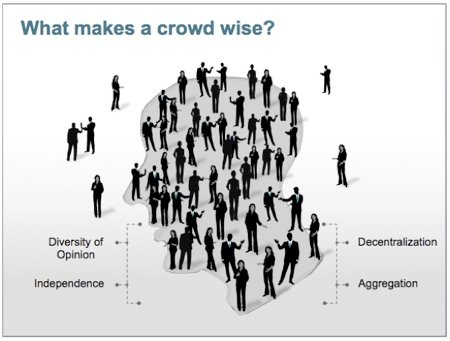The Wisdom Of The Steemian Crowd - Learning To Appreciate Content We Do Not Like
Internet has dramatically changed our life. If we have a question, we simply Google it, we read most of our news online, and we socialize with Facebook and Twitter.
We take it for granted, but in the 1960s, even the simplest collaboration among peers around the world in a shared document in real time was probably unimaginable.
More than lacking proper technological tools, I believe that, conceptually, it was just too big a place for that to happen. I believe we are on the brink of a much greater transition. This will not only impact every facet of our life, every industry, but it will also lead to new, social, organizational structures in our society.
I believe that "decentralized networks" - I will keep getting back to this terminology - will take over the roles of banks, corporations, and insurance companies within a decade or two. I believe that will be just the beginning.
If you look at a flock of starling birds in flight, for example - to me, they look a lot more like a living creature rather than a flock. Look at their movement and the flow. Beyond the beauty of that movement, what fascinates me is it seems there's no single bird responsible for coordinating that movement.

Imagine having in these decentralized networks millions of people and computers, rather than birds, cooperating around shared goals. How will it look like? What will it take to do it? And would it be a good or a bad thing? The basis for this revolution is the blockchain technology, the technology underlying bitcoin.
Middlemen are everywhere in our economy. They are there to store records, they are there to keep agreements on those records, and to take decisions. I own something if there is a social agreement that I own that thing. It is as simple as that.
Ownership is set by social agreement, and if there's no such agreement, then I don't own anything. This agreement needs to sit somewhere. For example, if the bank says I own 20 dollars, but I want 30, then we just trust the bank's records to hold to the truth. But as long as this record needs to be somewhere, it also needs to be in someone's hands, which gives that person enormous power.
Blockchain is this decentralized platform that tracks the records of value exchange so it keeps tracking who owns what at any point in time.
By being decentralized, it means that it sits nowhere and everywhere, or rather that each computer in the network will store a copy of that ledger, that public ledger, and can confirm the validity of that copy. So the entire network consents simultaneously.
Everyone can access the records, can control the records of his own assets, so I can transact money to my friend in China with a click of a button, and the money just goes through instantaneously.
The whole magic of blockchain is its ability to maintain continuously that consensus.
So we have just diffracted the network. The whole magic of blockchain is that, somehow, that network is being able to organically recover, and, in mere seconds, agrees with a consensus about a single reality.
We rely on intermediaries more than just to store our records, we also rely on them to process our agreements.
Let me give you an example. Let's say you and I want to place a bet. From the beginning of recorded history, we had to rely on a third party to place that agreement and give it the funds to secure and process the contract.
So, whenever we have economic interaction, we need intermediaries, we need middlemen to execute our contracts, to execute our economy.
With the advent of Blockchain 2.0, we can also remove the intermediaries from that, whereas before that, we wrote that agreement on paper or in code, and we placed it in the hands of a third-party both of us trusted together with the funds.
Now we can simply write it in code. We can place that code onto the blockchain. It has an address - We call it a smart contract. - and then we can transact money to that contract.
From that point onwards, the blockchain guarantees to self-execute the contract by the code, unambiguously; no middleman. no friction whatsoever.
So, if the magic of the Blockchain was that somehow the entire network agreed with consensus about records, in Blockchain 2.0, the entire network consents to the records, the agreements over the records, and the execution of those agreements.
If you want, if Blockchain is some sort of public ledger, then Blockchain is a public computer, a decentralized computer. This technology is already in process of replacing and reforming basically the entirety of today's financial infrastructure. The largest corporations, governments, banks, insurance companies are all racing to develop and implement this technology.
But in economy, we also rely on intermediaries at a deeper level: we rely on middlemen to take decisions for us, to direct and to coordinate. We need a CEO to run a company; we need governments to collect and distribute taxes; and we need a mayor to run a city.
We also need Airbnb to coordinate among people and the value flow between those people in a home rental network. There's already a movement towards the decentralization of opinion and the decentralization of coordination.
For example, today, if I'm hungry, I wouldn't probably ask professionals for what's the best solution in the neighborhood, but rather, I would just check up Yelp for the crowd's opinion. But as long as the power is in the hands of the platform owners, as long as the power is concentrated, there is an unavoidable conflict of interests and a single point of failure.
All this decentralization and resistance to censorship also comes with no central authority to censor content. This means we need to be more tolerant of content we find disagreeable or we risk becoming the censors we are trying to escape from.
So then, what if we had something like a Facebook network, but operated by peers and the computers in that network? Just a peer-to-peer service with no central server, no company, and no management; just self-organization?
What if we had a social version of Uber with the right chain app living in everyone's mobile phones, speaking with each other, peer-to-peer, with no central management, no central server, no central control?
What if thousands of software developers could spontaneously cooperate and develop software together?
Shares of the network will be distributed to participants according to their contribution, the value of their contribution, as perceived by other peers in that network.
Does this sound familiar? It should because Steemit is one example of exactly this. Like the flock of birds described earlier, we move with the intelligence of the crowd and become a living organism taking on a life of its own.

But you may ask, "How do those crowds make decisions together?" Clearly, each participant has her or his own opinion, but how do they consent to a single action?
How do we design such a system to be resistant to fraudulent behavior? How do we incentivize people to participate in their best professional way? And how do we maximally align everyone's interests?
These are exactly the typical questions we are researching with our Steemian colleagues since we began this experiment, the outcome of which we called a "decentralized governance protocol," which forms the game-theoretic basis for decentralized donor organizations.
It is still a work in progress, but we are taking on a life of our own as the first decentralized social platform and I believe the results will surprise us in the coming year.
Going back to those starlings, you can again try to imagine decentralized networks of millions of people and computers cooperating around shared goals. Those networks will have their own personality, their own value system, and even their own identity.
To the external observer, they'll look a lot more like a living organism than an organization. In the end, it must raise the question, "Would it be a good thing or a bad thing?" "Would it drive us towards a better or worse future?" And my answer to that is that technology, as always, is neutral, and thus, it only depends on us and on the way we use it.
Some people get attached to their expectations of what Steemit means to them and what kind of a platform they want it to be. We all have different interests and seeing a topic that we are not particularly interested in dominate the feeds of Steemit can distract them.
It is in human nature to criticize what we don't approve of or have an interest in and I see a lot of that on Steemit as new members with diverse interests converge on one platform. I believe it is not in the interest or the good of the whole community to try to control what topics people rally around.
Like the startling in flight, we cannot see the whole picture through our limited perspective and vantage point and have no idea what discoveries new projects that we may not be particularly aligned with could lead to.
For example, I've seen enough pizzagate posts to last me a lifetime recently, so much so that I don't even want to eat pizza. But you won't see me posting about, commenting about, or even ranting about it, just like those starling in flight are not paying attention to anything but the birds around them.
I just skip the posts that don't interest me and focus on what does interest me and let the rest of the crowd do the same and together, we grow and take on a life infused with the wisdom of the crowd.
Steemit is many different things to different people and will continue to evolve before our eyes.
Change is the only constant in life and a social platform like this one is bound to change as it matures, it's sure to go through growing pains and to survive we will need to be more tolerant of diverse opinions and people interested in things that don't interest us, so enjoy the ride and continue making Steemit what you envision it being.
Even if a topic like @steemsports, for example, does not interest you at all, there is still knowledge that can be gained from that experiment that could be applied to future projects and prove to be of value to the whole community. To criticize it could be shooting ourselves in the foot unknowingly.
Everyone can benefit from the learning experience this platform offers, regardless of what topic or project it currently centers around.
Et Vivere, Reservate - live and let live
There may come a day when Steemit has a preferrences tab and we can filter topics to our liking, but personally, I like being exposed to new ideas, points of views and topics I'm not familiar with. It stimulates my though muscles and keeps them fit and it's easy enough to skip things I find to be of no intellectual use to me.
From what I can see on Steemit so far, we have only scratched the surface and underneath the first layer of this social network, a golden opportunity is calling us to dig deeper into ourselves and bring our creativity, not our criticism, to life.
If we keep focusing on cooperating around shared goals with the people we interact with here, we will grow stronger as a community and thrive as a result.
Keep on Steeming on!

This post has been ranked within the top 10 most undervalued posts in the first half of Dec 29. We estimate that this post is undervalued by $17.10 as compared to a scenario in which every voter had an equal say.
See the full rankings and details in The Daily Tribune: Dec 29 - Part I. You can also read about some of our methodology, data analysis and technical details in our initial post.
If you are the author and would prefer not to receive these comments, simply reply "Stop" to this comment.
Fantastic post and a great vision. I'm definitely one of the people out there for whom Steemit has been a gateway to crypto and blockchain technology. I get to grow a bit more knowledgeable and a bit more excited everyday. My next area of research to tackle is the world of smart contracts. That tech is still a mystery to me in how it is executed, but I see tremendous value in the concept. 2017 is going to be fascinating in so many ways...
Steemit has launched me into researching crypto and blockchain too and it has opened my mind to new perspectives on a lot of unfamiliar topics. Brain food.
Sounds great :)
there is much more to come for sure, lookin forward to it. nice post :)
upvoted!
Thanks
Beautifully well written (except "intellectual" toward the end).
Should be in the FAQ as a general ideological overview.
Thanks for reading the post and pointing out the typo.
Great post. I hope it all comes to pass. But knowing human nature, someone somewhere will throw a Crypto-Spanner in the Chain.
Be prepared to be amazed and bitterly disappointed in the same moment. It's how we move forward.
Sir Tim Berners-Lee (Internets Daddy) was quoted as saying he thought, he had a Grand Moral Vision of what the Internet could become.
He just never considered Cat YouTube Video's as being part of it;D~
LOL. Funny
great post, will change all our lives in so many ways.thankyou
Very topical post. When I think of the role of technology in society, I think it is always important to point out that technology is a two-edged sword. I think that is the general idea you have conveyed in this post.
We dream of and embrace new technologies, often envisioning the advances we will make and the positives to be gained. History has shown that for every technological advance, there has been an unexpected consequence.
I don't say this to be a doom and gloom merchant, but to keep people's expectations real. The internet was an amazing advance, but could we really foresee all the abuses that would arise from it? We could barely visualize how it could change society in those early days.
Decentralization and blockchain technologies as a subset of the decentralization movement is an interesting advance. It may well be the 'wisdom of the crowd' and it is my hope that will be an aspect of it. It may well be mob psychology too. Populists inciting emotional animalistic responses.
The best response is to keep our eyes open and be aware of what is happening.
Very good point indeed.